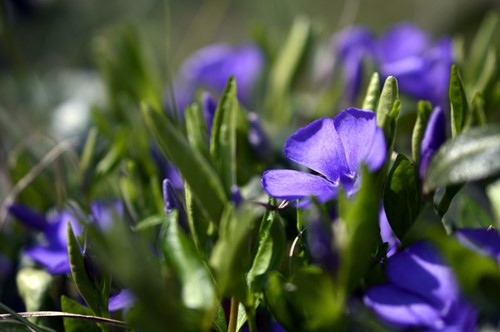
If you’re searching to replace your lawn or simply fill in an empty space in your garden, there are many groundcover plants you can choose from. Some produce flowers while others have attractive foliage, but regardless of expressions you can benefit from planting something in the space to keep out opportunistic weeds. However, it’s important to consider how much time and effort you’re willing to spend on a groundcover plant, especially if you’re going to have a large area. Here we’ve put together a guide to some of the best low-maintenance groundcover plants for your landscaping project.
Sedum is a genus of succulent plants often called stonecrops. Angelina sedum in particular makes excellent groundcover because the flowers will spread efficiently to cover a large area, but won’t grow out of control. The foliage and flowers are golden yellow and easy to propagate by rooting. The only real maintenance required for this plant is to chop the longest stems to prevent self-rooting if you’re worried about it spreading beyond its designated area.
Nepeta is a plant in the catmint family with purple flowers that can bloom all summer long with practically no human intervention. Some nepeta varieties are natural spreaders and can quickly take over a large area of your landscape. Others are more bushy and take up space with their volume rather than covering the ground. Either way, nepeta is excellent for keeping the weeds out of your garden and is happy with only occasional watering in the growing season.
Creeping thyme stays very low to the ground—only 3 inches tall—and will spread naturally over an area with deep pink flowers and fragrant leaves. While related to the variety of thyme used in cooking, it is not edible. However, the flowers are great for attracting bees, butterflies to your yard. Creeping thyme does best in areas with full sun and well-draining soil.
Periwinkle is such an efficient and aggressive spreader that many gardeners consider it a nuisance. However, its resilience and charming purple flowers make it an excellent choice of ground cover that does not require a lot of maintenance. The leaves are dark green and glossy and grow on vines that spread at ground level. This plant loves the shade, so if you have space with little sunlight during the day periwinkle may be a perfect fit.
Rockrose is an evergreen shrub with hardy, colorful flowers. This tough plant is common in coastal regions as it can stand up to strong winds and salt spray without care. When grown as groundcover, all you need is a few shrubs to start with and you’ll have an area full of established roots and bright green foliage. It’s best to water them regularly after planting them but once they’ve lasted one season, they can thrive with no ongoing maintenance.
As for any type of plant, it’s crucial to research what will grow best in your particular climate. You also need to consider the specific landscape you’re working with and whether there is a significant amount of shade, full sun or combination. Regardless, you’ll find there are plenty of options for ground cover that will keep out the weeds and look attractive with only the most basic of care.

An enthusiastic polo player, aviatrix and fourth generation member of one of the oldest winery families in the Napa Valley, Roberta has lived in the Bay Area her entire life. She has over thirty years of experience in buying, selling and managing real estate in the residential, investment and commercial markets. Not content to just “get the job done”, she wants to exceed your expectations. Roberta believes in service with commitment. Utilizing the kind of knowledge that is obtained only through extensive life experience and an in-depth understanding of the area and local market, she works with you to provide maximum results. During her accomplished career, Roberta has refined important skills in communication, negotiation, attention to detail and sound business practices, all of which are vital to the success of her clients today. Please call Roberta directly at 707.339.0233 to discuss your real estate needs.